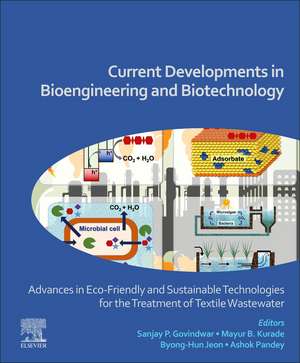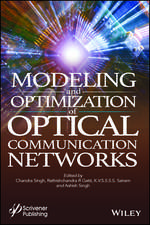Current Developments in Bioengineering and Biotechnology: Advances in Eco-friendly and Sustainable Technologies for the Treatment of Textile Wastewater
Editat de Ashok Pandey, Sanjay P. Govindwar, Mayur B. Kurade, Byong-Hun Jeonen Limba Engleză Paperback – 23 feb 2023
- Introduces the global scenario of textile pollution, including country-wide industrial contribution, severity, and ecological consequences
- Covers both conventional treatment technologies for the removal of synthetic dyes, such as adsorption and coagulation, along with several novel approaches of advanced treatment options, including photocatalysis and advanced oxidation processes
- Provides an in-depth analysis of bioremedial approaches, including the application of bacterial, fungal/yeast, microalgae and plants, and enzymatic biotransformation for the degradative metabolism of dyes
- Includes genetic engineering, metagenomics, microbial fuel cells, and biofilm-based immobilization techniques and bioreactors
Preț: 1057.67 lei
Preț vechi: 1377.72 lei
-23% Nou
Puncte Express: 1587
Preț estimativ în valută:
202.43€ • 210.52$ • 169.39£
202.43€ • 210.52$ • 169.39£
Carte tipărită la comandă
Livrare economică 07-21 martie
Preluare comenzi: 021 569.72.76
Specificații
ISBN-13: 9780323912358
ISBN-10: 0323912354
Pagini: 786
Ilustrații: Approx. 120 illustrations
Dimensiuni: 191 x 235 mm
Greutate: 1.32 kg
Editura: ELSEVIER SCIENCE
ISBN-10: 0323912354
Pagini: 786
Ilustrații: Approx. 120 illustrations
Dimensiuni: 191 x 235 mm
Greutate: 1.32 kg
Editura: ELSEVIER SCIENCE
Cuprins
1. Introduction: Global scenario of textile pollution; Country-wise industrial contribution, severity, and ecological consequences
2. Detrimental effects of synthetic dyes on ecology: Ecotoxicity and its evaluation methods
3. Biogenic synthesis of the metal oxide-based photocatalysts for dyes removal
4. Recent advances of hybrids layered double hydroxides as catalysts for removal of synthetic dyes from wastewater
5. Recent advances in the metal-organic framework and its derivative nanoparticles for effective textile wastewater treatment
6. Waste material recycled adsorbent for abatement of textile dyes
7. Biochar: A sustainable approach for the adsorptive removal of hazardous textile dyes
8. Exploiting waste-biomasses through solid-state fermentation (SSF) approach for efficient treatment of textile wastewater
9. Water reclamation from textile dyeing wastewater: a membrane-enabled sustainable approach
10. Role of Analytical Techniques in the treatment of synthetic dyes and textile effluent
11. Bacterial mediated degradation of synthetic dyes
12. Fungal mediated degradation of synthetic dyes
13. Yeast mediated degradation of synthetic dyes
14. Exploration of Lichens for bioremediation of textile dyes: A journey from hypothesis to evidence
15. Extremophiles as an important mediator of choice in biodegradation of synthetic dyes and textile effluent
16. Microalgae-based biotechnologies for efficient treatment of diverse dyes from wastewater
17. Cactus: A promising candidate for the efficient remediation of hazardous dyes
18. Phytoremediation of synthetic dyes and textile effluent
19. Mixed microbial consortium for the decolorization of textile dyes
20. Enzymes responsible for the metabolism of synthetic dyes
21. Optimization: Most influential parameters affecting bioremediation process of dyes and textile wastewater
22. Integrated chemical and biological processes for the effective degradation of synthetic dyes
23. Advances in constructed wetland systems and its engineered designs for the realistic treatment of textile effluents
24. Microbial immobilization for gaining industrial feasibility for textile wastewater treatment
25. Bioreactors for dye removal from wastewater
26. Bioelectrochemical systems for treatment of textile dyes and wastewaters
27. Autochthonous microbes and its efficacy to mitigate environmental pollutants from the textile industry
28. Advanced genetic engineering methods for dye degradation
29. Systems biology and multi-omics integration of bioprocessing in textile wastewater treatment
30. The problems and bottlenecks associated with textile treatment technologies including real scale feasibility issues and their possible solutions
2. Detrimental effects of synthetic dyes on ecology: Ecotoxicity and its evaluation methods
3. Biogenic synthesis of the metal oxide-based photocatalysts for dyes removal
4. Recent advances of hybrids layered double hydroxides as catalysts for removal of synthetic dyes from wastewater
5. Recent advances in the metal-organic framework and its derivative nanoparticles for effective textile wastewater treatment
6. Waste material recycled adsorbent for abatement of textile dyes
7. Biochar: A sustainable approach for the adsorptive removal of hazardous textile dyes
8. Exploiting waste-biomasses through solid-state fermentation (SSF) approach for efficient treatment of textile wastewater
9. Water reclamation from textile dyeing wastewater: a membrane-enabled sustainable approach
10. Role of Analytical Techniques in the treatment of synthetic dyes and textile effluent
11. Bacterial mediated degradation of synthetic dyes
12. Fungal mediated degradation of synthetic dyes
13. Yeast mediated degradation of synthetic dyes
14. Exploration of Lichens for bioremediation of textile dyes: A journey from hypothesis to evidence
15. Extremophiles as an important mediator of choice in biodegradation of synthetic dyes and textile effluent
16. Microalgae-based biotechnologies for efficient treatment of diverse dyes from wastewater
17. Cactus: A promising candidate for the efficient remediation of hazardous dyes
18. Phytoremediation of synthetic dyes and textile effluent
19. Mixed microbial consortium for the decolorization of textile dyes
20. Enzymes responsible for the metabolism of synthetic dyes
21. Optimization: Most influential parameters affecting bioremediation process of dyes and textile wastewater
22. Integrated chemical and biological processes for the effective degradation of synthetic dyes
23. Advances in constructed wetland systems and its engineered designs for the realistic treatment of textile effluents
24. Microbial immobilization for gaining industrial feasibility for textile wastewater treatment
25. Bioreactors for dye removal from wastewater
26. Bioelectrochemical systems for treatment of textile dyes and wastewaters
27. Autochthonous microbes and its efficacy to mitigate environmental pollutants from the textile industry
28. Advanced genetic engineering methods for dye degradation
29. Systems biology and multi-omics integration of bioprocessing in textile wastewater treatment
30. The problems and bottlenecks associated with textile treatment technologies including real scale feasibility issues and their possible solutions


